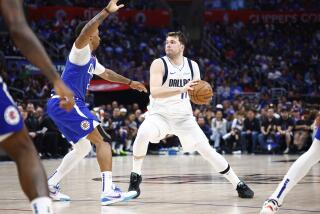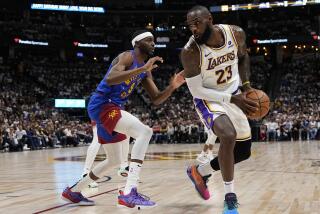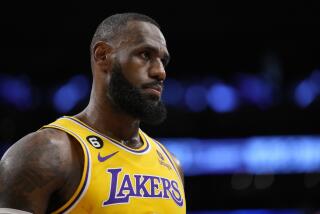NBA Doesn’t Hold Its Peace With Lockout
Since these are the ‘90s, what better way to end an NBA season that had a little of everything than with . . .
A lockout!
The NBA, which had never had a job action of any kind, said Friday that it will lock its players out today until they agree to a new contract.
A postseason lockout is largely ceremonial since no games are at risk. But the situation is complicated by a group of agents and players who are trying to take over the National Basketball Players Assn. They are attacking on all fronts, asking the National Labor Relations Board to decertify the union, suing the NBA before the Minneapolis judge who handed football players a victory over the NFL.
With no one sure who speaks for the players, no quick resolution is expected, and real games--which start in November--might be at risk next.
“It’s like we were about to be married,” union vice president Charles Smith said from his Connecticut home. “We were standing at the altar and the judge said, ‘If anybody has an objection, speak your piece.’ And somebody stood up.
“Now I think it’s going to be hard to get us back to the altar. Things don’t look good right now.”
Union representatives and NBA officials had agreed to a deal, but under challenge by insurgents, led by agent David Falk and star clients Michael Jordan, Patrick Ewing and Alonzo Mourning, the union’s own player-representatives refused to ratify it.
The agreement called for added revenues that would be shared with players, a rise in the salary cap from $15 million to $23 million, a luxury tax intended to tighten the cap and a rookie salary cap. Some players said the luxury tax, which would kick in on certain large contracts, would limit salaries and prevent player movement.
Union negotiators were told to reopen talks with the league. There was a meeting Thursday in New York, which Smith called “downbeat.”
“You’ve got this decertification floating around somewhere,” Smith said. “It’s just tough right now.”
The lockout will paralyze the teams, preventing signings and trades. Several deals that have been agreed to--Detroit’s for Otis Thorpe, the Clippers’ for Brian Williams--can’t be completed until a new agreement is signed.
Teams cannot try players out or sponsor summer league games. Team facilities will be closed and all benefits--such as health insurance--canceled.
“Recent events left the owners with no other option,” Commissioner David Stern said in a statement, “because the players repudiated a hard-fought agreement containing compromises and difficult choices by both sides and the moratorium that kept this league operating this past season has now expired. It’s a shame that the success we and our players have enjoyed as a result of working together is now in jeopardy.”
Russ Granik, deputy commissioner, added: “The deal reached last week was the product of 18 months of hard-fought good-faith bargaining. If that deal is no longer acceptable to the players, then we are prepared to keep negotiating. Lawsuits, threats by a few agents and lawyers and a campaign of misinformation to our players have now placed next season at even greater risk.”
The union took an understated position to the lockout. A spokesman said Friday it was “the NBA’s internal business,” adding talks would continue.
But the insurgents reacted angrily, suggesting counterattacks: players who are owed money over the summer suing to become free agents; players cutting a separate deal with corporations now sponsoring the NBA.
One of the insurgents, Los Angeles-based Steve Kauffman, called the league’s action, “ludicrous.”
“They’re just trying to scare players so they can ram a contract down their throat. There’s a small faction of players who get panicked by everything. To me, this is a lot of trouble to go to to scare a few players.”
Said Ron Grinker, another insurgent: “Everything’s going to be in the courts. Like I said when they first mentioned a lockout, ‘Aw, not us [basketball], too.’ We don’t need it. Sports doesn’t need it.”
Nothing can be done until the divided players are reunited, but early returns aren’t promising.
Kauffman called for the union to join the insurgents.
“I think it’s totally irresponsible for what exists of the union--and I’m not sure what that really is--not to join the decertification effort,” he said.
Meanwhile, Smith said the players have lost control of their fate.
“It was said at our meeting, if we were going to decertify, let it come from the union, not a group of agents,” he said. “We said as a union, that [decertification] is an option of ours.
“We said, ‘Let’s communicate.’ We all agreed. Then all of a sudden, the decertification is filed. We didn’t hear a word from the guys. They just went ahead and did it.”
More to Read
Go beyond the scoreboard
Get the latest on L.A.'s teams in the daily Sports Report newsletter.
You may occasionally receive promotional content from the Los Angeles Times.










